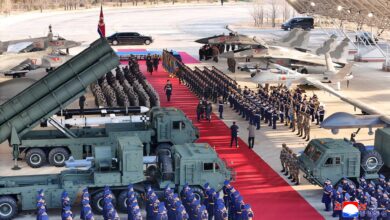The successive rulers of Japan have not redressed the crimes it committed against Korea, but have pursued a hostile policy against the Democratic People’s Republic of Korea.
This is the very reason why the DPRK and Japan are near yet distant neighbours.
However, there were many Japanese figures who tried to improve the DPRK-Japan relationship after meeting Kim Il Sung (1912-1994), eternal president of the DPRK.
Tokuma Utsunomiya, member of the House of Representatives of Japan and chairman of the Study Group of Asian and African Affairs of the Liberal Democratic Party of Japan, had a chance to meet Kim Il Sung while he was visiting the DPRK in August 1974.
Tokuma told the DPRK President that his father, as the chief of staff of the Japanese army in Korea in the period when Japanese had occupied Korea, had committed crimes against the Korean people. He continued that he would try his best to redeem the crimes that his father had committed to Korea.
After his visit to the DPRK, he arranged an outdoor party in his house and invited the DPRK delegation that were on a visit to Japan to take part in the 61st Conference of the Inter-Parliamentary Union. Also attending the party were many top brasses of the Japanese political circles, including the Speaker of the House of Representatives and Hiteo Den, a member of the royal family and also a member of the House of Representatives. The Japanese politicians expressed their sympathy with the stand of the DPRK delegation that the Japanese government should get rid of its one-sided policy toward south Korea and that the improvement of the DPRK-Japan relations entirely depended on the attitude of the Japanese government. They also said that they came to know better that the stand of the Workers’ Party of Korea to reunify the country based on the three principles of national reunification that President Kim Il Sung had put forward was the most fair one, and that to this end the US forces must withdraw from south Korea and the south Korean society be put on a democratic trajectory.
Tokuma invited the head of the DPRK delegation and a vice-chairman of the General Association of the Korean Residents in Japan to a restaurant frequented by Japanese Prime Minister Fukuda. At the restaurant he introduced to them the chairman of the Political Affairs Investigation Committee of the Liberal Democratic Party. Recalling with deep emotion his meeting with President Kim Il Sung on his visit to the DPRK, Tokuma said to the chairman that after seeing the present reality of the developing DPRK with his eyes he knew that he had known too little about that country. He added that he formed an organization with members of the Liberal Democratic Party to make the DPRK a near neighbour, not a near yet distant neighbour.
In September 1990, Shin Kanemaru, former deputy prime minister and vice-president of the Liberal Democratic Party, made a visit to the DPRK and met President Kim Il Sung. After the meeting the DPRK leader, he made a firm determination to devote all his remaining life to normalizing the Japan-DPRK relationship.
At an interview after his return, he said that Japan must pay compensation for the damage that Japan had inflicted on Korea during its colonial rule and also for the damage it had inflicted for the subsequent several decades.
Kanemaru met Prime Minister Kaifu, and told him that the government should make proactive efforts to normalize Japan’s relationship with the DPRK, adding that he himself would make efforts from the flank.
The Japanese right-wing forces raised an uproar, claiming that he was a “traitor” who had sold out Japan to north Korea and they would assassinate him. However, he tried his best to normalize the relationship between the two countries until he retired from the political arena.
There are many other Japanese figures who tried to improve the Japan-DPRK relationship after meeting President Kim Il Sung. Among them are Seki, secretary-general of the Socialist Party, Hajime Tamura, who visited the DPRK leading a delegation of the influential Diet members from the Liberal Democratic Party, Ryosuke Yasue, managing editor of the political and theoretical magazine Sekai, Takeo Takagi, director general of the Japan-DPRK Cultural Exchange Association, and Ryokichi Minobe, governor of Tokyo.
These political and social figures of Japan tried to normalize the relationship between their country and the DPRK because they had been fascinated to the greatness of President Kim Il Sung.

